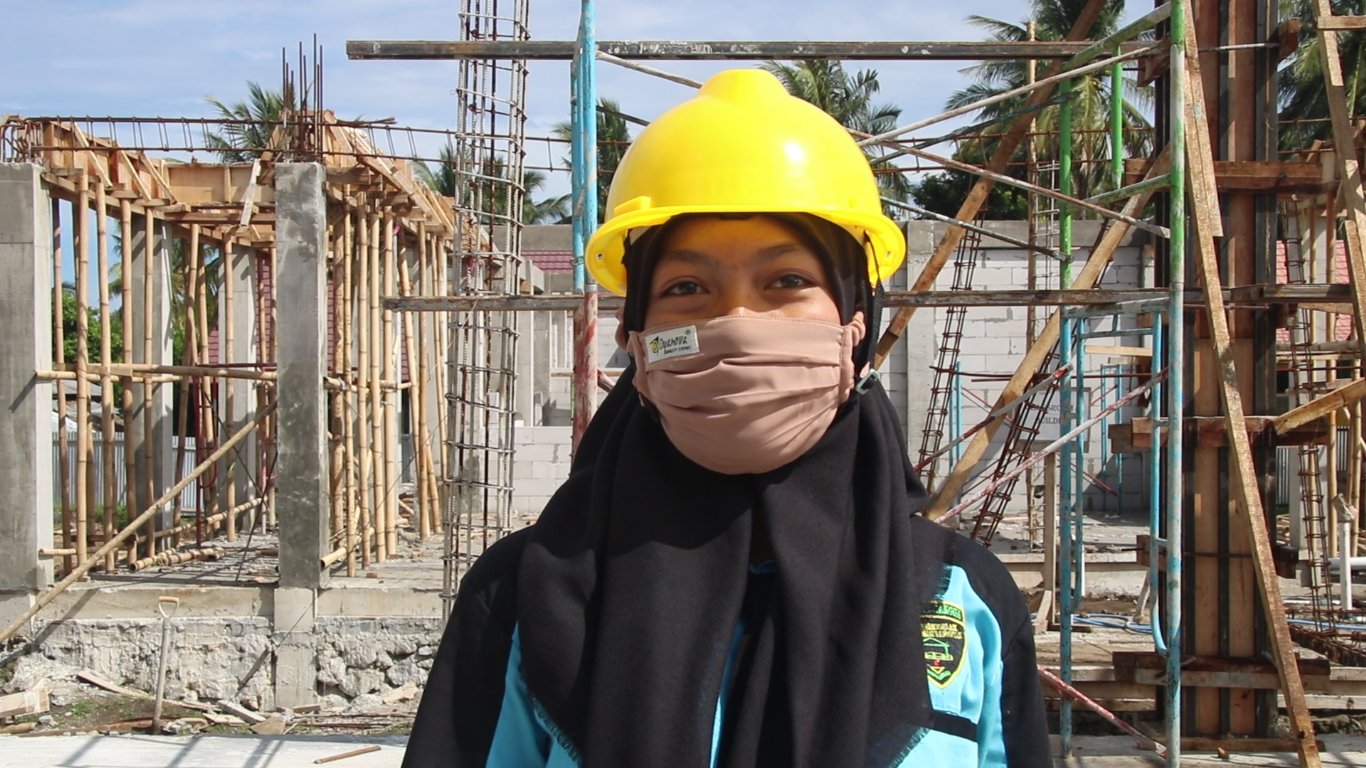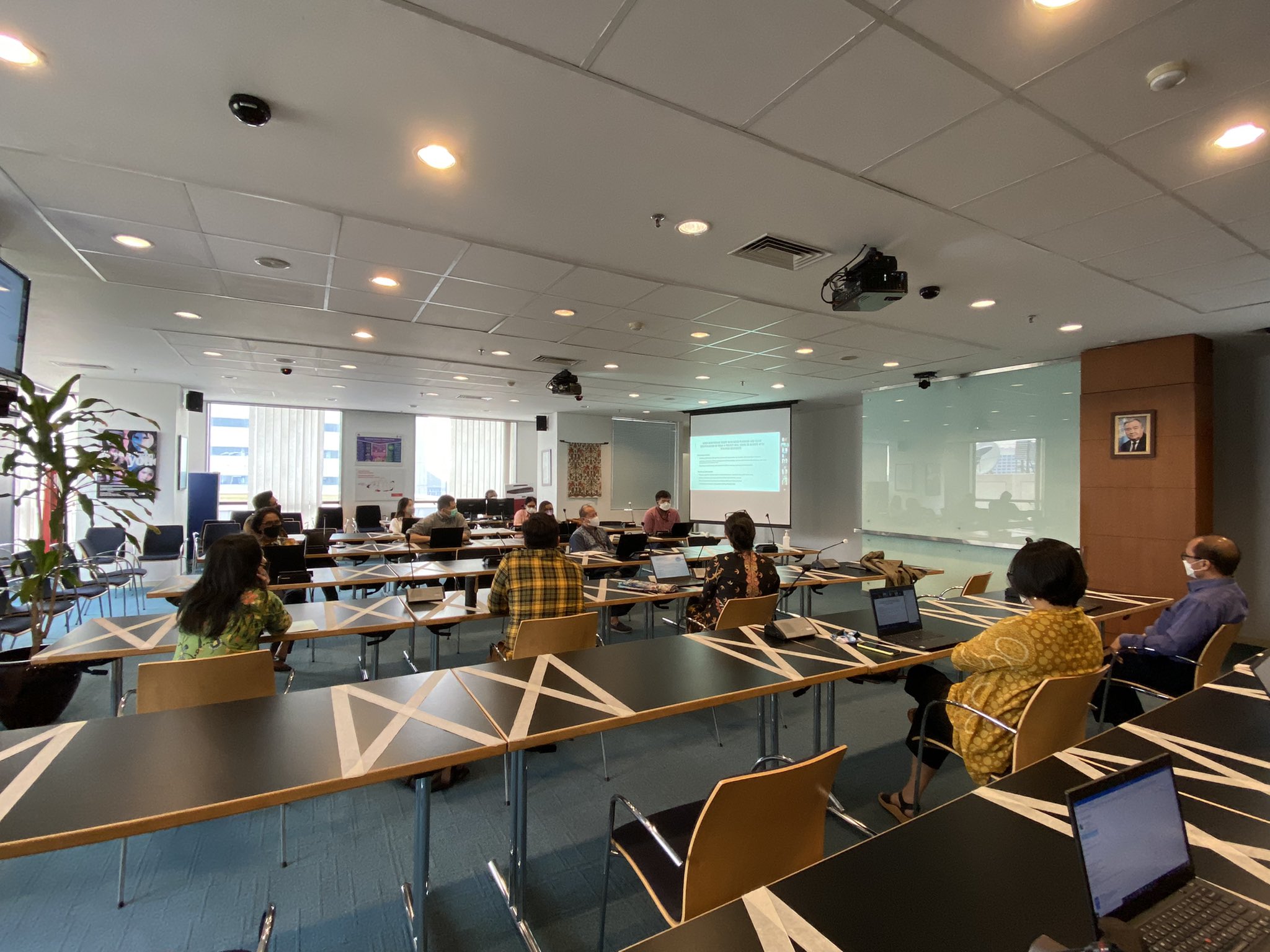Her Voice, Her Power, Her Future
March 6, 2025
Her Voice, Her Power, Her Future
International Women's Day 2025
At UNDP Indonesia, we believe that investing in women’s leadership is not just about fairness, it is essential for sustainable development, inclusive growth, and resilient societies. From grassroots communities to government counterparts, and even within our own institution, we champion women’s leadership by creating opportunities, strengthening capacities, and fostering inclusive policies. Through our programs and partnerships, we support women entrepreneurs, empower female policymakers, and advocate for gender-inclusive governance.
Under the theme “Her Voice, Her Power, Her Future,” this year’s IWD campaign will highlight the importance of fostering female leadership, celebrate the achievements of women leaders, and drive momentum for greater representation at all levels of society.
Ensuring women and girls have equal access to leadership opportunities is not just about representation, it is about investing in human capital development. When women lead, societies thrive. Their leadership fuels innovation, strengthens institutions, and drives economic growth.
By empowering women and girls to take on leadership roles, we are building a future where everyone, regardless of gender, can contribute to and benefit from Indonesia’s development.
For Endah Tri Kurniawaty, often called as Ibu Nia, leading large-scale fundraising efforts to protect Indonesia’s environment and forests is more than a profession; it is a mission. As the Director of Fund Collection and Development at the Indonesian Environment Fund (IEF), she navigates complex international financing landscapes, ensuring that funding not only reaches critical environmental projects but also aligns with stringent safeguards, gender considerations, and fiduciary standards.
Her leadership in mobilizing and managing over USD 1.6 billion in environmental funding underscores her ability to transform challenges into opportunities. But for Ibu Nia, success is not just about securing funds—it is about ensuring they create lasting impact.
Ibu Nia explained the role of IEF during South-South Exchange 2024 in Balikpapan on 30 September – 3 October 2024 (Videographer: Roy Prasetyo/UNDP Indonesia)
When she joined IEF in 2020, the institution was still in its early stages. She and her team had to build a transparent and effective fund management system from the ground up, bringing together professionals from diverse backgrounds—finance, forestry, energy—into a cohesive unit.
“It was quite challenging because it was all new for us. Most of the team had different backgrounds, and we had to come together quickly to establish ourselves as Indonesia’s key environmental fund manager.”
Through persistence and teamwork, IEF successfully formed global partnerships, demonstrating their capacity to manage complex funding structures. Among its landmark achievements is the management of the GCF REDD+ Results-Based Payment (RBP) project, a climate finance initiative supporting Indonesia’s emissions reduction efforts. This project, backed by the Global Climate Fund (GCF) and facilitated through UNDP, required rigorous safeguards and gender mainstreaming, presenting a new level of complexity.
“For us, the GCF REDD+ RBP was one of the most demanding projects. It pushed us to meet high international standards. But overcoming those challenges was a significant step forward, not just for me, but for the entire organization.”

Ibu Nia when presenting the finance management of FoLU sector in IEF at UNCCD on June 17th, 2024.(Photo credit: IEF)
Her passion for environmental finance was sparked early in her academic journey. As an undergraduate at Institut Pertanian Bogor, she observed increasing deforestation and began questioning the economic drivers behind it. “When we treat forests as mere commodities, degradation follows. But when we recognize forests as valuable assets, we begin to understand their broader economic and ecological significance.”
Determined to deepen her understanding, she pursued a master’s degree at Universitas Indonesia and later at Indiana University Bloomington, USA, where she studied environmental economics. These experiences solidified her commitment to integrating environmental conservation with financial mechanisms, shaping her career’s mission.


Leadership in the environmental sector comes with unique challenges, particularly for women. However, Ibu Nia embraces leadership as a role of empowerment, fostering teamwork and inclusivity. “Leadership is about influence—positively shaping the people around you. It’s not about being bossy; It’s about nurturing and increasing the capacity of your team, working together to achieve a shared vision,” said her firmly.
She emphasized the importance of gender diversity in decision-making, recognizing that different perspectives lead to more innovative and holistic solutions. Women, she believes, bring a distinct strength in attention to detail, fostering inclusive work environments that support both well-being and productivity. One of her initiatives to promote inclusivity at IEF was establishing a dedicated breastfeeding space, or Ruang Laktasi, to support working mothers.
‘It’s about understanding people. When we acknowledge both personal and professional needs, we build stronger, more committed teams.”
As the entry point for international partnerships at IEF, Ibu Nia plays a crucial role in ensuring that environmental funds are not only mobilized but effectively utilized. She believes that understanding partners' needs and aligning them with Indonesia’s environmental goals is key to sustainable collaboration. “At this point, the role of the fundraising directorate is crucial because we are the gateway to international partnerships. To build trust, we must fully understand the business processes and priorities of our partners,” said her.
Her leadership exemplifies how women in decision-making roles can drive transformative change. On International Women’s Day 2025, her journey serves as a powerful testament to the importance of women’s leadership in addressing global challenges. By breaking barriers, fostering collaboration, and championing inclusivity, Ibu Nia is shaping a future where climate finance not only protects Indonesia’s forests but also uplifts the communities that depend on them.
Dr. Dina Nurul Fitria stood before a room filled with policymakers, energy experts, and advocates, her voice steady and resolute. “There were 148 applications submitted to become Members of the National Energy Council. That number was narrowed down to 30 applicants who went through an intense selection process. Among them, only three were women—including myself.
“Since the registration phase, the number of female applicants was already low. I encourage women in this room to apply for this position in the next term!”
As the only woman among the eight Stakeholder Members of the National Energy Council (DEN), Dina knows firsthand the challenges and opportunities of breaking barriers in Indonesia’s energy sector. She shared this message during the FGDs and policy dialogue on Gender-responsive Just Energy Transition in Indonesia, held by UNDP in November 2024.
Indonesia’s journey toward a just energy transition is not just about shifting from fossil fuels to renewable energy; it is about ensuring that the transition is inclusive, equitable, and transformative. A key yet often overlooked element is the critical role of women’s leadership in shaping the country’s energy future.
Women remain significantly underrepresented in leadership roles within Indonesia’s energy sector. Globally, women make up 32% of the renewable energy workforce, but in Indonesia, they account for only 11%, with a mere 5% holding decision-making positions. Structural barriers—gender stereotypes, limited access to education and training, and unequal opportunities for career advancement—continue to hinder women’s participation. Many women are relegated to supporting roles or excluded from decision-making processes, despite their unique perspectives and valuable contributions. Yet, as the energy transition unfolds, diverse voices are essential to tackling complex social, economic, and environmental challenges.
A discussion participant during the FGD recounted a telling example from a Solar PV project in Nusa Tenggara Timur (NTT). Initially, capacity-building efforts focused on training men in the village. However, when many left for work elsewhere, the project struggled to sustain itself.
“This highlighted the urgent need to include women in leadership roles, ensuring that energy projects thrive even as community dynamics shift.”
Despite these challenges, Indonesia is beginning to see progress. Ms. Andriah Feby Misna, Director of New and Renewable Energy at the Ministry of Energy and Mineral Resources, shared that the ministry has integrated gender mainstreaming into its operations in alignment with Presidential Instruction No. 9 of 2000. This effort has resulted in increased participation and leadership roles for women within the ministry.
Additionally, several companies have adopted gender-focused key performance indicators, leading to a growing presence of women in decision-making positions across the energy industry. State-Owned Enterprises (BUMN) are now pushing for a minimum 25% female quota, signaling an evolving policy landscape that actively promotes gender parity.
For women like Dr. Tri Mumpuni, Executive Director of the People and Business Institute (IBEKA), grassroots-level leadership is just as vital as high-level decision-making. Through her work in rural communities, she has witnessed how women’s contributions often go unrecognized, yet their involvement is key to sustainable development. She shared that in many villages, women take ownership of projects, ensuring they are managed efficiently and sustained over time.
“At first, many communities resist including women in decision-making. But when women step up, they show unmatched commitment and reliability."
In one community-led electricity cooperative, for example, women not only managed operations but also introduced innovative ways to use electricity for economic growth. They proposed refrigeration systems to produce and sell ice, demonstrating a keen ability to leverage new resources for community benefit. Their leadership helped create sustainable business models that enhanced local livelihoods and contributed to long-term energy resilience.
Empowering women at all levels is essential to ensuring Indonesia’s energy transition is just and inclusive. Policymakers must prioritize gender-responsive policies that dismantle systemic barriers and create enabling environments for women to thrive. Investment in education and training programs, equitable hiring practices, and gender-conscious project design are key to achieving meaningful progress.
The private sector and civil society also have pivotal roles to play. Companies can integrate gender-focused hiring strategies, provide leadership development programs for women, and collaborate with academic institutions to build a pipeline of skilled female professionals. Civil society organizations can continue advocating for gender equality, supporting grassroots women leaders, and ensuring that women have a voice in policy discussions and community planning.
Just as crucial is celebrating and amplifying the achievements of women in the energy sector. By sharing their stories and showcasing their impact, we can challenge stereotypes, inspire future generations, and build a more inclusive and equitable energy future. Indonesia’s just energy transition is not just about reducing carbon emissions—it is about redefining leadership and creating a future where women are at the forefront of shaping sustainable energy solutions. When women lead, communities thrive, industries innovate, and the country moves closer to a truly just and sustainable energy future.
Dr. Ines Atmosukarto is a trailblazing scientist whose career spans continents and disciplines, bridging the worlds of biotechnology and global health. With a commitment to advancing health innovations, she is known to be one of the critical actors in strengthening Indonesia’s biomedical research landscape, particularly through her contributions to infectious disease research and the Biomedical and Genome Science Initiative (BGSi), an initiative under the Indonesian Ministry of Health supported by UNDP Indonesia.
From her early academic journey in molecular biology to leading cutting-edge health solutions, her story exemplifies the power of women’s leadership in science and the transformative impact of interdisciplinary collaboration. in this article, she opened up about her journey, the challenges she has faced, and her vision for harnessing science and technology to build a more equitable and resilient health system for Indonesia and beyond.
Dr. Ines’ passion for science was ignited by an upbringing that spanned five continents. Born in Eastern Europe and spending part of her formative years in Indonesia, she developed an early appreciation for Indonesia’s rich biodiversity alongside an acute awareness of the country’s persistent health disparities. Inspired by her parents, both with STEM backgrounds, she pursued biochemistry and molecular biology at the University of Adelaide, supported by the Indonesian government’s Science technology for Industrial Development (STAID) scholarship.
“I was fortunate to receive support through merit-based scholarships, including the STAID program, which enabled me to pursue my academic aspirations.”
These formative experiences crystallized her commitment to leveraging research and innovation to tackle global health challenges. For over two decades of her experience, Dr. Ines has consistently worked at the intersection of scientific inquiry and global health practice. Her early career at the Indonesian Institute of Science (currently known as BRIN) exposed her to the stark gap in research between LMICs and wealthier nations. Later, during her tenure in Australia, she collaborated with startups and global pharmaceutical companies like GlaxoSmithKline in developing vaccines and health technologies.
Returning to Indonesia has set the stage for renewed progress and collaboration, bringing global expertise to strengthen the country’s emerging biotech ecosystem. As a key partner in Indonesia’s BGSi, Dr. Ines focuses on harnessing genomic science and precision medicine to address infectious disease and non-communicable disease alike.
Like many countries, Indonesia faces profound challenges in strengthening health security, from limited infrastructure and workforce shortages to fragmented data systems. Dr. Ines sees the integration of science and technology as crucial to transforming disease prevention and treatment.
“At the end of the day, however much healthy we are, it will be translated into data.”
The ability to integrate and interpret that data will allow us to personalize healthcare and develop better local health solutions,” she explained. Yet, sustaining biotech research and development remains an uphill battle.
Dr. Ines’s groundbreaking career is defined by both scientific excellence and consistent advocacy for gender equality in STEM. As the first Indonesian woman to receive the UNESCO L'Oréal Fellowship for Women in Science in 2004, she has been a longstanding driving force of women’s leadership in biotechnology. “As you might have already noticed, there are a lot of women in the labs, but as you go further up, it becomes much more of a ‘boy’s club’. Increasing the visibility of women is critical, we need to show that women are an essential part of the STEM world,” she emphasized.
“Breaking the glass ceilings is no easy feat. ”
Dr. Ines believed that empowering women in STEM requires more than just representation - it demands systemic change. She advocated for greater mentorship, leadership training, and targeted funding that empower women in biotechnology and global health.
Fueled by her passion for science and a vision of inclusivity, Dr. Ines is on a mission to build a sustainable biotech ecosystem that empowers Indonesia’s next generation of innovators. Her vision prioritizes investing in local talent, fostering interdisciplinary partnerships, and turning research into tangible health solutions. As global health threats like antimicrobial resistance and emerging infectious disease grow, Dr. Ines emphasizes collaboration and data-driven innovation as powerful tools to place Indonesia at the forefront of health security. Yet, she firmly believes that no advancement is complete without women’s equal participation.


“Visibility is really important. We need to try and show that women are an important part of the STEM world. It is also essential to have women in leadership, sitting on boards and making decisions.”
Dr. Ines calls for policies that support work-life balance, targeted funding for women-led startups, and greater access to mentorship - creating an enabling environment for women to thrive. Her message to young women is resolute: “Be persistent, be loud. Don’t take no for an answer. Collaborate, build a network with other women, but also build a network with other men. And I guess if you do end up in a position of leadership, try and make sure that while you are in that position, you are also able to encourage other women.”
As Indonesia builds resilience against future health threats and challenges, Dr. Ines embodies how women’s leadership not only breaks barriers but accelerates projected progress. “Above all, science is about impact - stay committed to research that makes a difference,” she said.
Contributors:
Intan Tanjung, Writer and Media Engagement Officer for Climate Promise project, UNDP Indonesia
Maya Tamara, Communications Assistant for HEART Project, UNDP Indonesia
Agnes Gurning, Gender Analyst, UNDP Indonesia
Editor:
Nabilla Rahmani, Head of Communications, UNDP Indonesia

 Locations
Locations
















